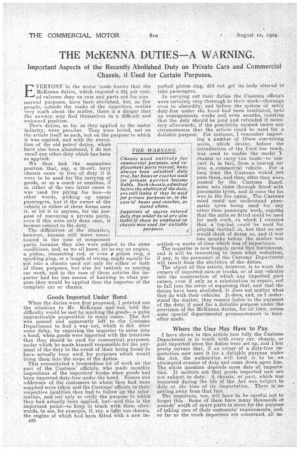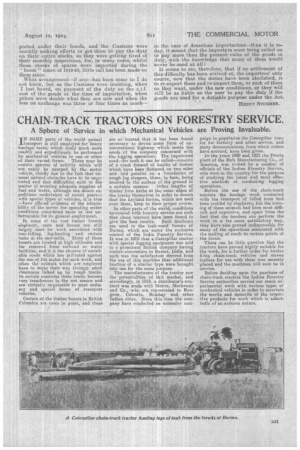THE McKENNA DUTIES—A WARNING.
Page 14

Page 15

If you've noticed an error in this article please click here to report it so we can fix it.
Important Aspects of the Recently Abolished Duty on Private Cars and Commercial Chassis, if Used for Certain Purposes.
EVERYONE in the motor trade knows that the
M.cKenna duties, which imposed a 33* per cent ad valorem duty on cars and parts not for corn mercial purposes, have been abolished, but, as few people, outside the ranks of the importers, realize • very mush about the matter, there is a danger that the unwary may find themselves in a difficult and awkward position. These duties, so far as they applied to the motor industry, were peculiar. They were levied, not on the article itself as such, but on the purpose to which it was applied, and with the exceps tion of the old petrol duties, which have also been abandoned, I do not recall any other duty which has been so applied.
We thus had the anomalous position that, say, a 30-cwt. lorry chassis came in free of duty if it were to be used for The carrying of goods, or as a coach or omnibus, if in either of the two latter cases it was used for plying for hire—in other • words, picking up casual passengers, but if the owner of the . vehicle in either of these forms used it, or let it to anyone, for the purpose of conveying a private party, even if this were only done once, it became subject to the duty.
The difficulties of the situatioe, however, became still more accentuated in the case of component parts, because they also were subject to the iame conditions, and, as we all know, let us say an engine, a piston, connecting rod, or even g piston ring, a sparking plug, or a length of wiring, might equally be put into a chassis used not only for either or both of these purposes, but also for taxicab or touring car work, and in the case of these articles the importer had far less means of knowing to what purpose they would be applied than the importer of the complete car or chassis.
Goods Imported Under Bond.
When the duties were first proposed, I pointed out the situation to Mr. McKenna and was told the difficulty would be met by marking the goods—a quite impracticable proposition in many cases. The Act was passed and apparently left to the Customs Department to find a way out, which it did alter some delay, by requiring the importer to enter into
• a, bond, when.goods were imported with the intention that they should be used for commercial purposes, under which he made himself responsible for the payment of the duty in the event of their being found to have actually been used for purposes which would bring them. into the scope of the duties.
This necessitated a tremendous lot of work on the part of the Customs' officials, who made monthly inspections of the importers' books_ when goods had been imported duty-free under the bond. Names and addresses of the customers to whom they had been supplied were taken and the Customs' officers in their .respective localities then had to follow up the information, and not only to verify the purpose to which they had actually been applied, but--and this is the important point—to keep in touch with them afterwards, to see, for example, if, say, a light van chassis, the engine of which had been fitted with a new im
B30 ported piston ring, did not get its body altered to take passengers.
In carrying out their duties the Customs officials were certainly very thorough in their work—thorough even to absurdity, and before the system of entry duty-free under the bond had been instituted, held up consignments weeks and even months, insisting that the duty should be paid and refunded if. necessary afterwards, if the possibility existed under any circumstances *that the article could be used for a dutiable purpose. For instance, I remember import ing a number of Olson converting units, which device, before the
introduction of the Ford ton truck, was used to enable the model 1. chassis to carry ton loads—to convert it, in fac:re from a touring car into a commercial vehicle. For a long time the Customs would not pass them and then, after they were passed by the Customs Board. some sets came through fitted with pneumatic tyres, and at once the fat was in the fire again. The Customs mind could not understand pneumatic tyres being used for any other than passenger work, arguing that the units so fitted could be used for such work, to which I retorted that a"top-hat could be used for playing football in, but that no one would think of doing so, and it was two months before the matter was settled—a waste of time which was of importance.
The importer is now happily saved that foolishness, and it will be interesting to learn what reduction, if any, in the personnel of the Customs' Department . will result from the abolition of the duties.
The object of this article, however, is to warn the owners of imported cars or trucks, or of any vehicles into the construction of whirh any imported part enters, even if only as a substitution in repair, not to fall into the error of supposing that, now that the duties have been abolished, it does not matter whal. they do with their vehicles. It does, and, as I understand the matter, they remain liable to the payment of the duty, if used for a dutiable purpose under the provision of the Melienna duties, for all time, unless some special departmental pronouncement is hereafter made.
Where the User May Have to Pay.
I have shown in this article how fully the Customs Department ,is in touch with .every car, chassis, or part imported since the duties were set up, and I feel pretty certain that, if an owner of a duty-free importation-now uses it for a dutiable purpose under the Act, the authorities will hold ..it to be . an attempted evasion of duty and come down upon him. The whole question depends upon date of importation. It matters not that goods imported now are not subject, to duty. A chassis, or part, which was imported during the life of the Act was Subject to duty at the time of its.importation . There is no getting away from that fact.
The importers, too, will have to be careful not to forget this. Some of them have many thousands of pounds' worth of spare parts in store for the purpose of taking care of their customers' requirements, and; so far as the truck importers are concerned, all im ported under their bonds, and the Customs were recently making efforts to get them to pay the duty on their entire stocks, as they were getting tired of their monthly inspections, for, in many cases, whilst these stocks of spares were imported during the boom" times of 1.919-20, little call has been made on them since.
What arrangement--if any--has been come to I do not know, but as theCustoms were insisting, when last heard, on payment of the duty on the c.i.f. cost of the goods at the-time of importation, when prices were double what they are now and when the loss on exchange was three or four times as much—
in the case of American importations—than it is today, it meant that the importers were being called on to pay more than the present value of the goods in duty, with the knowledge that many of them would never be used at all I it seems to me, therefore, that if no settlement of this difficulty has been arrived at, the importers' only course, now that the duties have been abolished, is to re-export them and re-import them, or such of them as they want, under the new conditions, or they will still be as liable as the user to pay the duty if the goods are used for a dutiable purpose under the Act.
z
HENRY STIIRMET.
































